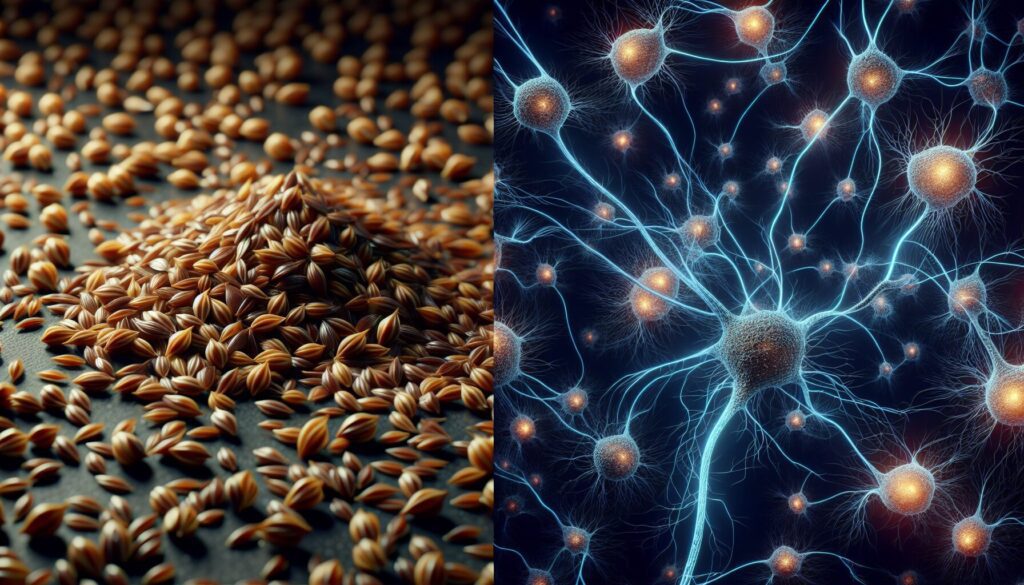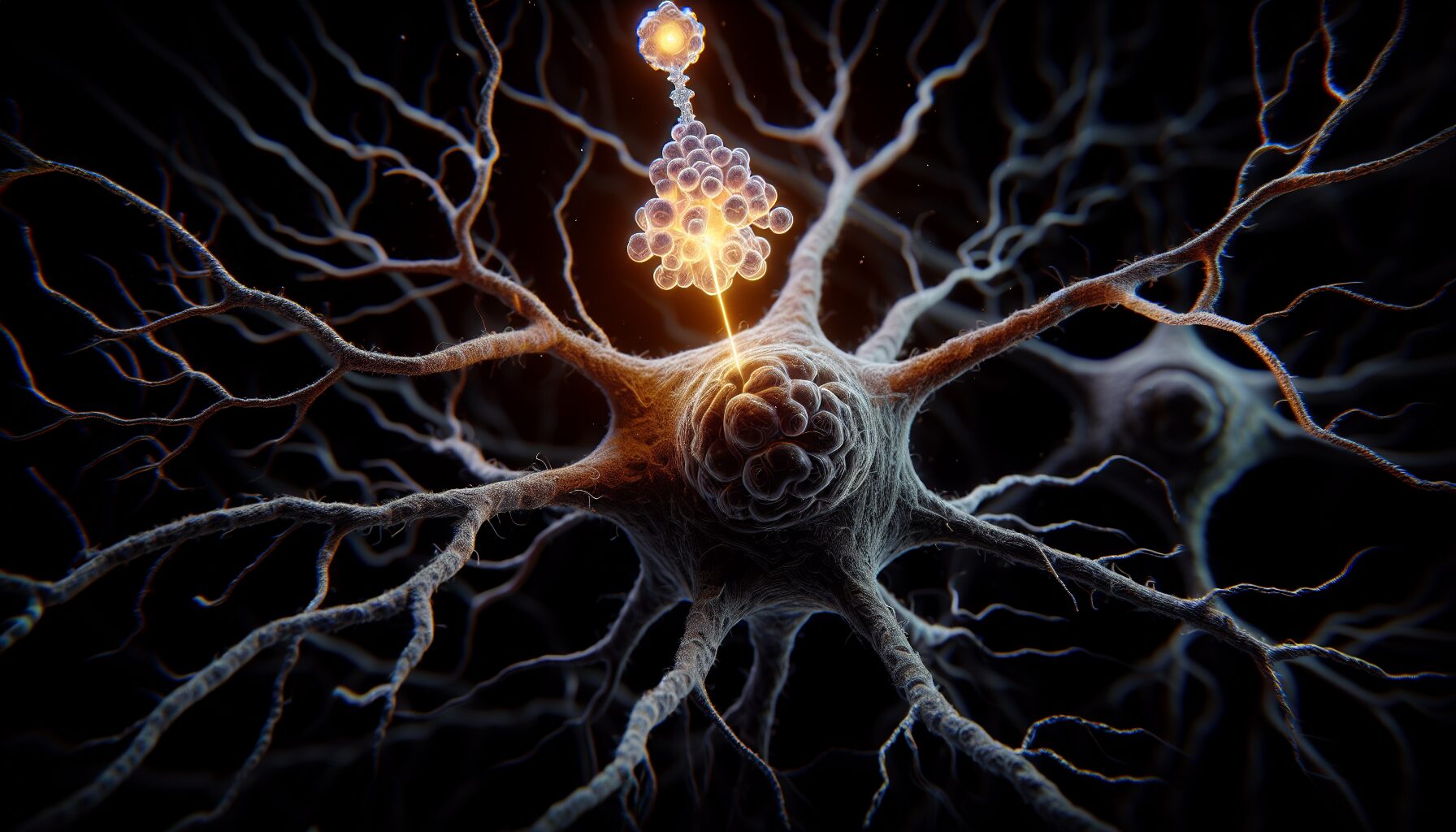
Flax Seeds Benefits For Brain Health
Flax seeds may have benefits for brain health because of their rich fatty acid content. Our brains are very nutrient hungry. Brain tissue requires a constant stream of cellular health supportive nutrients. Not just energy supporting molecule but structural parts too.
Fat forms an important part of brain tissue which supports the brain both structurally and functionally. Brain tissues contain a high amount of fat relative to other parts of the body. Maybe the most other than fat deposits. There is a very high amount of omega 3 and omega 6 polyunsaturated fatty acids within the nervous system along with other fats too.
Flax seeds are a rich source of bioactive compounds such as polyunsaturated fatty acids. These are able to integrate into brain or nerve cell membranes. Flax seeds contain high amounts of an omega 3 fatty acid known as alpha linolenic acid. This also converts into other omega 3 fatty acids and is why alpha linolenic acid is a possible brain health supportive nutrient.
Flax seeds are one of the most nutrient dense sources of fatty acids such as alpha linolenic acid on the planet. This makes flax seeds of interest to people who would like to support brain health. Fats have a really bad reputation in health and wellness communities but they are needed as part of a healthy diet.
Here the possible benefits of flax seeds for the optimal health our brain will be outlined to show why you may wish to add more of this food to your diet.

Flax Seed ALA And Brain Health
You may have heard of DHA or EPA omega 3 fatty acids. ALA or alpha linolenic acids is another omega 3 fatty acid which you can find in plants. This omega 3 fatty acid also converts to DHA and EPA within the body.
Flax seeds are one of the richest source of alpha linolenic acid on the planet. Research suggests that alpha linolenic acid may have a strong functional significance in the brain.
Diets rich in flax seeds may improve brain weight and density of brain fatty acids. This includes flax seed omega 3 fatty acids such as alpha linolenic acid or DHA. Omega 3 fatty acid deficient diets may reduce the total omega 3 fatty acid content of forebrain. Research also suggests that omega 3 supplements may improve omega 3 levels by 50% within the brain.
This is not a surprise considering the significant structural and functional role of fatty acids in brain functioning. Brain and nerve cells wrap themselves in layers of fat tissue. This fat tissue is called myelin. Myelin assists with speeding up the process of nerve transmission. Speed of nerve transmission is essential for optimal cognition and responsiveness to environmental changes.
Flax Seeds And Thinking Speed
Brain neurotransmitter levels have been shown to improve with flax seed intake and this is also influential on the health of the brain. Neurotransmitters are important for ensuring signals within the brain are sent efficiently for optimal brain functioning and responsiveness.
Initial research with DHA suggests that this omega 3 fatty acid is associated with more optimal learning ability and spatial awareness. This could be due to the role of essential fatty acids in myelin and brain or nerve cell transmission. Another clinical study found that the regular consumption of flax seeds improved verbal fluency and cognition in older adults.

Neuroprotection
Fatty acids like our bodies are very prone to oxidative damage. Research suggests that flax seeds could be protective of brain development in unborn babies and some studies show they support improvements in sex hormone levels.
Flax seeds may also have mild neuroprotective abilities in some cases because of an antioxidant characteristic. This may also raise the protective antioxidant levels in the brain to reduce oxidative stress within the brain. Antioxidants also preserve fatty acid health promoting status and prevent them going rancid.
Some conditions create ammonia toxicity within the body. Flax seed oil is thought to have some capacity to protect nerve cells from ammonia caused stress damage and maintain healthy cognition. The linoleic acid and alpha linolenic acid content of flax seeds could contribute to this. The regular consumption of flax seeds could also protect the energy levels of the brain to prevent mental fatigue.
Flax Seeds And Nervous System Stresses
Dietary flax seed may also reduce risk of brain or nervous system stress and associated disorders. This may be because of the supportive functions of fatty acids such as alpha linolenic acid or DHA.
Depression is a mood disorder which influences daily performance. Depressed individuals seem to have low EPA and DHA levels in many cases. Clinical studies have also shown that flax seed supplements could also reduce symptoms of depression. Other studies have found that flax seed supplements may be able to modulate anxiety too.
One study found observable improvements in brain signalling from flax seed consumption in depressed people. Research suggests this is attributable to the high ALA or alpha linolenic acid content of flax seeds. ALA is able to cause neurogenesis or nerve growth within important brain areas via brain growth factor release. Brain growth factor is linked to improvements in cognitive ability.
This therefore presents flax seeds as being supportive of optimal brain health. Flax seeds may reduce nervous system stresses or disorders such as depression. Oils from flax seeds have been shown to support the mental health of children with bipolar disorders.

Flax Seed Oils And Brain Inflammation
Omega 3 fatty acids such as those obtainable from flax seeds seem to be calming on systemic inflammation within the body and this could also positively influence brain health too.
Reductions in pro inflammatory cytokines have been observed with omega 3 fatty acid use and this may be an influencing factor in depression. Omega 3 fatty acids also support cell membrane fluidity and structure which are all factors which could reduce symptoms of depression.
Some studies show that the inclusion of some healthy fat sources in our diet such as flax seeds may contribute to reducing the risks of neurodegeneration and neurodegenerative diseases. Fatty acids within flax seeds may also strengthen the blood brain barrier to further support the health of the brain.
Flax Seed Antioxidants And Brain Health
Flax seeds also contain various bioactive compounds which act as antioxidants within the body.
Lignan is polyphenol produced by flax seeds which humans and gut bacteria are able to digest. Some studies suggest that this compound is able to improve cognition because of antioxidant properties which may lower inflammation. Lignan digestion products from gut microbes may also reduce systemic inflammation within the brain. Flax seeds also contain healthy levels of antioxidant tocopherols or vitamin E which may contribute to lowered risk of Alzheimer’s disease.
Antioxidant compounds such as lignan and tocopherols may therefore contribute to the inflammation lowering qualities of flax seeds and support more optimal brain health.

Flax Seed Dietary Fibre And Brain Health
Around 40% of the total flax seed nutritional contents is dietary fibre. These are tough or complex sugar chains which humans can not naturally digest themselves but our gut microbes can. Dietary fibre can consist of cellulose or lignin which you find in plant cells. These compounds maintain the overall robustness of plants.
Healthy amounts of dietary fibre in our diet promotes gut health and could also protect us against some diseases. The gut brain axis is an important contributor to mood disorders such as anxiety or depression throughout our life.
Some harmful bacteria produce mild toxins in the body which increase systemic inflammatory responses and oxidative stress. Healthy gut bacteria prevent these from growing in the body and reduce risks of systemic inflammation. This includes the brain and is one means as to which flax seeds could influence brain health through gut microbes. Lowered levels of inflammation are more supportive of higher cognitive abilities.
Some studies suggest that individuals with depression could benefit from flaxseeds. This is because they may reduce the growth of bacteria which could worsen factors that influence depressive symptom risk such as inflammation.
Flax seed fatty acids such as alpha linolenic acid are also able to influence the growth of gut microbes. Studies show that flax seeds may enhance growth of health supportive gut bacteria because of bioactive compounds.
They may also tighten gaps between gut cells to prevent leaky gut and further inflammatory damage from health harming bacteria. Our gut bacteria produce small fatty acids from their own digestion which are thought to influence brain health via anti inflammatory effects within the body.
Fatty acids like alpha linolenic acid and gut bacteria supportive compounds provide flax seeds with possible brain health supportive benefits.

Summary
Flax seeds are rich in nutrients which could have benefits for the health of our brain. Brain tissue contains a large amount of fatty acids and these are important both functionally and structurally.
Flax seeds provide a source of these being rich in alpha linolenic acid which is able to convert into other omega 3 fatty acids for the body to use. Flax seeds may cause an accumulation of omega 3 fatty acids in the forebrain.
Fatty acids play an important role in myelin sheath formation. This is responsible for speed of nerve transmission. Flax seed intake may improve cognitive functioning and learning. There are also significant increases in neurotransmitter levels with flax seed consumption which support the optimal functioning of the brain.
Clinical studies show that flax seed supplements could reduce symptoms of depression or anxiety. The high alpha linolenic acid content of flax seeds is thought to be the reason for this. Alpha linolenic acid may stimulate brain growth factor release which is linked to healthy cognitive functioning.
Flax seeds could also reduce levels of inflammation within the brain and support higher antioxidant levels to offer neuroprotective benefits. They may strengthen the blood brain barrier too. Excessive oxidative stress and inflammation can cause damage to nerve and brain cells. Flax seed antioxidants may play a large part in this alongside the fatty acids within flax seeds. Lignan and tocopherols have been identified as core antioxidants of flax seeds.
Flax seeds are also able to influence brain health through gut microbes. Health promoting gut microbes reduce systemic inflammation and flax seeds promote the growth of these. Flax seeds may also reduce leaky gut. This could lower the risks of depression or anxiety.
For more interesting articles see the main articles page below.





